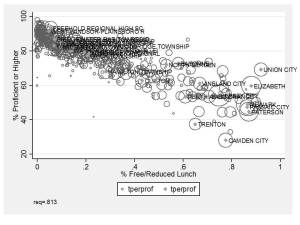A Poverty of Thinking about Poverty Measures in New Jersey School Finance

Cross Posted at http://njedpolicy.wordpress.com/2013/07/18/a-poverty-of-thinking-about-poverty-measures-in-new-jersey-school-finance/
Link to PDF of Policy Brief: Poverty_Counts_July_2013
Bruce D. Baker, Rutgers University, Graduate School of Education
Introduction
Every few years or so, in nearly any state but especially in those where leadership is actively seeking ways to reduced financial support to local public school districts serving lower income children,[1] one can expect the re-emergence of politically induced media outrage over rampant fraud in National School Lunch Program. The usual course of events is as follows:
- Manufacture some scandalous but largely anecdotal manifesto about how local district officials are egregiously mislabeling children as low income in order to hoard and obscene sums of state aid.
- Manufacture other claims that poverty really doesn’t matter anyway and certainly these poverty measures have little or nothing to do with determining whether children are likely to do well in school.[2]
- Assign a task force composed mainly of lay people with little or no expertise in education policy, finance or specifically the measurement of poverty, to swallow whole the manufactured evidence and generate politically convenient policy recommendations.
During my years in Kansas, on faculty at the University of Kansas, similar debates occurred with regularity. At one point, the legislature established an “At Risk Council” whose charge was to evaluate alternative proxies for determining student need, to be used in the state aid formula. Former education Commissioner Andy Tompkins was assigned to chair the task force, which
